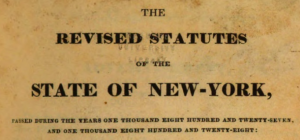Articles Posted in Uncategorized
Holding Over and Recent Revisions to New York Landlord-Tenant Law
 Prior blog posts have discussed the operational aspects of holdover landlord-tenant eviction proceedings. Holdover proceedings, unlike non-payment proceedings, occur when a tenant’s lease term has expired, or when a tenant has never had a lease, and either party exercises their legal prerogative to terminate the tenancy. This is in contrast to a non-payment proceeding, which is when a tenant with a valid lease fails to make his rent payments.
Prior blog posts have discussed the operational aspects of holdover landlord-tenant eviction proceedings. Holdover proceedings, unlike non-payment proceedings, occur when a tenant’s lease term has expired, or when a tenant has never had a lease, and either party exercises their legal prerogative to terminate the tenancy. This is in contrast to a non-payment proceeding, which is when a tenant with a valid lease fails to make his rent payments.
Recently, the New York State Legislature passed the Housing Stability & Tenant Protection Act of 2019, which became fully effective in October, 2019. This legislation comprises multiple amendments to the Real Property Actions and Procedure Law and the Real Property Law of New York State and has a significant effect on holdover proceedings. This blog post will explore the changes created by the new law.
The first important revision relates to the notice period prior to commencing a Court proceeding in a holdover action. Under the previous law, either party had the right to terminate a month-to-month tenancy upon thirty day’s notice. This notice period applied in two situations – if the tenant had an existing lease which expired by its term, or if the tenant never had a lease. Once the lease expires, or, after a month for which the tenant paid rent, the party seeking termination would serve a “Notice to Quit” upon the other party. This Notice would state that the month-to-month tenancy would terminate in thirty days. If the tenant had paid rent for the month, the termination notice would have to be dated at least thirty days after the month for which rent was paid. For example, the month-to-month tenant has paid rent for the month of October. This covers the period from October 1st through October 31st. The thirty-day termination notice would have to terminate the lease as of the end of the month after October, so it would state that the tenancy would terminate as of November 30th. In addition, once the notice was served, but prior to a Court action being commenced, the landlord would not be allowed to collect rent for the following month (in our example, November), as it would make the termination notice ineffective, and subject any Court action to being dismissed on that basis.
 New York Real Estate Lawyers Blog
New York Real Estate Lawyers Blog





